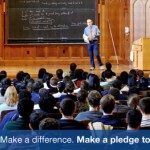Academia
I was really angry riding home on the bus last Friday night. Not angry because the transit system here in Toronto is royally fudged in general or that transit to York University is fudged in particular.
No, it wasn't that particular aspect of the public sphere that had me upset.
It was the growing tendency of publishers of all sorts to try and take their works out of the public cultural commons and place them exclusively behind pay walls. It's their desire to monetize every reading transaction that had me hot under the collar.
Here's what I tweeted standing on the bus, altered a bit for…
Photo source.
Such sad news today - Whitney Houston died at the young age of 48. I have always enjoyed, and admired, her soaring soulful voice. What will her legacy be?
Besides being a highly gifted artist, she has established a lasting legacy - a school devoted to the arts, just a few miles from my campus, based in East Orange, New Jersey.
Their mission statement is:
Whitney E. Houston Academy will strive to provide an environment in which every student learn and every staff member can grow. To achieve maximum success in this regard, we will provide challenging educational opportunites…
Walter Isaacson's book on Apple founder & CEO Steve Jobs is a fairly long book. It's not exactly a thriller either, especially since I know how it ends. As a result it took me a while to plow through it. I tended to read it in bursts of 40 or 50 pages over a few days then maybe put it aside for a while.
As a result, I ended up reading a bunch of other auto/biographical works at the same time. And there are some interesting parallels.
Ozzy Osbourne's I Am Ozzy and Tony Iommi's Iron Man: My Journey through Heaven and Hell with Black Sabbath are both great books. Like Jobs they are…
Note: this post is superseded by: Around the Web: Research Works Act, Elsevier boycott & FRPAA.
This post has superseded my previous post which focused solely on the Research Works Act. I have added some coverage of the Elsevier boycott which at least partially grew out of opposition to the RWA. I'm not attempting to be as comprehensive in coverage for the boycott as for the RWA.
Some relevant resources:
The Cost of Knowledge: Researchers taking a stand against Elsevier (Boycott declaration site)
Notes on the Research Works Act a wiki maintained by Peter Suber, hosted by the Berkman…
There's been a lot written recently about academic publishing, in the kerfuffle over the "Research Works Act"-- John's roundup should keep you in reading material for a good while. This has led some people to decide to boycott Elsevier, including Aram Harrow of the Quantum Vatican. I'm generally in favor of this, but Aram says one thing that bugs me a bit:
Just like the walled gardens of Compuserve and AOL would never grow into the Internet, no commercial publisher will ever be able to match the scope and ease of access of arxiv.org. Nor can they match the price. In 2010, there were about…
OpenYale courses.
Looking for free, open source learning materials about any subject, from top experts in the world? I used to think that MIT's OpenCourseWare and Yale's OpenYale courses were a "one stop shopping" source for this, until I came across this stunning, worldwide, multi-lingual collection of course materials.
I invite you to explore this collection of free learning materials, including course syllabi, exams and study guides in a wide array of subjects, from the US, the UK, Europe, Japan, South Korea, Saudi Arabia, Taiwan, China...you get the idea.
Many thanks to Junqiang Zhou…
So you want to be an astrophysicist?
You've suffered through 3-4 years of undergrad, and you're ready for more.
You picked the places to apply to (or have you...?), and you're ready for the paperwork.
Another lightly retouched blast from the past...
So what do you do?
First you apply to the departments.
There are 35 astronomy departments in the US with a PhD program, and some sub-departments within physics departments.
As a rule, go directly to the department web site you are applying to and read carefully (ie do not go to the Graduate School at the University, until/if the department…
Penn State Nittany Lions head coach en:Joe Paterno on the sideline during warmups prior to the 2006 Homecoming game versus the University of Illinois on Friday, October 20, 2006.
Joe Paterno at Penn State was one of the most successful, and controversial, football coaches at the University level. What will his real legacy be?
From The New York Times:
Joe Paterno, whose teams won more games than any other major-college football coach, who became the face of Penn State University and a symbol of integrity in collegiate athletics only to be fired during the 2011 season amid a child sexual-…
So, now you're at university, and you're thinking about heading for grad school ...
More re-runs from Ye Olde Blogge
The following is horribly UScentric, 'cause that's where I am right now.
The general principles are broadly applicable, the actual getting into grad school procedure bit in future post will be both US and THEM centric.
Now what?
Caveat: these numbers are somewhat dated, but the shift is not large enough yet for me to bother re-searching them.
Each cohort in the US is about 4+ million people, about 4000 of those major in physics. Since participation in the further education in…
Photo by Nicolas Genin.
66ème Festival de Venise (Mostra)
In the touching film "Up in the Air," Ryan Bingham played by George Clooney has an ambition of earning ten million frequent flyer miles, for which he:
receives an instant upgrade: a personally engraved metal card that will allow him to directly access his own private operator, someone who will greet him by name.
No such thing exists for publishing - whether you're a writer, a reviewer or an editor - until now.
Mike Fowler of the Nature Network describes a new "publishing revolution" in his recent blog post. The current system…
You are at university.
Do you like stars, and stuff?
Another rehashed blast from the past
Should you do astronomy as an undergrad? (the following is in part shamelessly cribbed from a colleague's previous freshman seminar for our majors):
Do you like stars and stuff?
If not, you probably should look for an alternative to astronomy, on the general principle that at this stage of life you should at least try to do things you actually like.
If you do, good for you. Now, do you have the aptitude?
Professional astrophysics/astronomy is not about looking at stars per se (except at occasional…
What should a high school student do to get on a track to become an astrophysicist?
Reworked from an oldie.
Yeah, it is cheap blogging, but moderately timely and fills space...
So, you're in high school wondering what to do with yourself, and you think: "hey, I could be an astrophysicist!"
So, what should YOU do, wanting to get into a good university and an astro/physics major?
1) Take all the math that is offered, and do well in it.
The limiting factor for most students wanting to do astronomy or astrophysics is poor math preparation in school. You need to get as far and as fast in calculus…
My course this term is on time and timekeeping, but is also intended as a general "research methods" class. This was conceived by people in the humanities, where the idea of generic research methods makes a lot more sense than in the sciences (where there's a lot more specialization by subfield), but I'm going to try to give as general an overview of how to approach scientific research as possible in a course with no prerequisites. The following is sort of a rough sketch of a lecture for next week, on how to approach the scientific literature, so comments and suggestions are welcome. This is…
Note: this post is superseded by: Around the Web: Research Works Act, Elsevier boycott & FRPAA.
Following on my post from yesterday on Scholarly Societies: It's time to abandon the AAP over The Research Works Act, I thought I'd gather together some of the recent posts on the issue.
The Wikipedia article is here, full text of the bill here and status here.
2012.01.04. New US Publisher Anti-OA Legislation by Cable Green
2012.01.04. A Threat to Open Access: the Research Works Act by Lisa Federer
2012.01.05. Update on publishers and SOPA: Time for scholarly publishers to disavow the AAP by…
In comments to Friday's snarky post, I was chided for not engaging with the critique of standardized testing offered by Washington Post education blogger Valerie Strauss. I had intended to say more about the general topic, as there have been a bunch of much-cited articles in a similar vein crossing my RSS reader recently, but I sprained my ankle playing basketball at lunch, which kind of blew a hole in my afternoon...
Looking at her posts, though, it's hard to really engage with her critique, because there's next to nothing there to engage with. In the most recent post, the closest thing to a…
So, The Research Works Act, H.R. 3699 is a new piece of legislation that is being introduced in the US.
Not surprisingly it's supported by the American Association of Publishers and its Professional and Scholarly Publishing (AAP/PSP).
The legislation is aimed at preventing regulatory interference with private-sector research publishers in the production, peer review and publication of scientific, medical, technical, humanities, legal and scholarly journal articles. This sector represents tens of thousands of articles which report on, analyze and interpret original research; more than 30,000 U…
As mentioned a few times previously, the class I'm teaching this term is a "Scholars Research Seminar" on time and timekeeping. As this is an entirely new course, and will be consuming a lot of my mental energy, I plan to post occasional reports on what I'm doing to the blog.
Today was the first day of class, so a good chunk of the time was spent on introducing the basics of the course (my PowerPoint slides, for those who care), and going through one slightly silly example.
The stated learning goals for SRS courses (students should learn how to formulate a research question, find and evaluate…
It's the first day of class today (for me, anyway-- classes technically started yesterday, but I don't teach on Tuesdays this term). This, of course, means that something will go horribly wrong. The question is, what?
What will go wrong on the first day of class today?
This is a class for first-year students, so quantum superpositions of multiple answers are not allowed.


